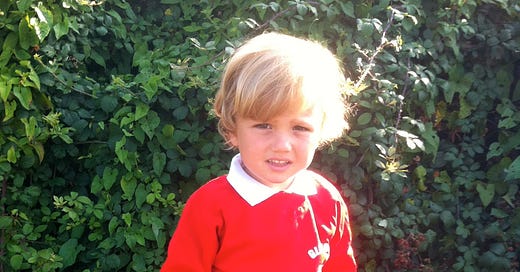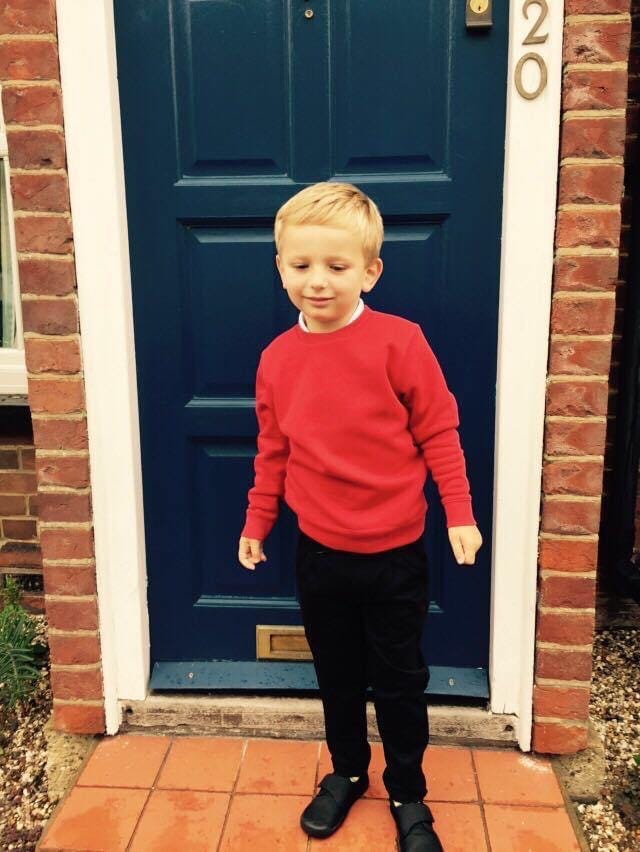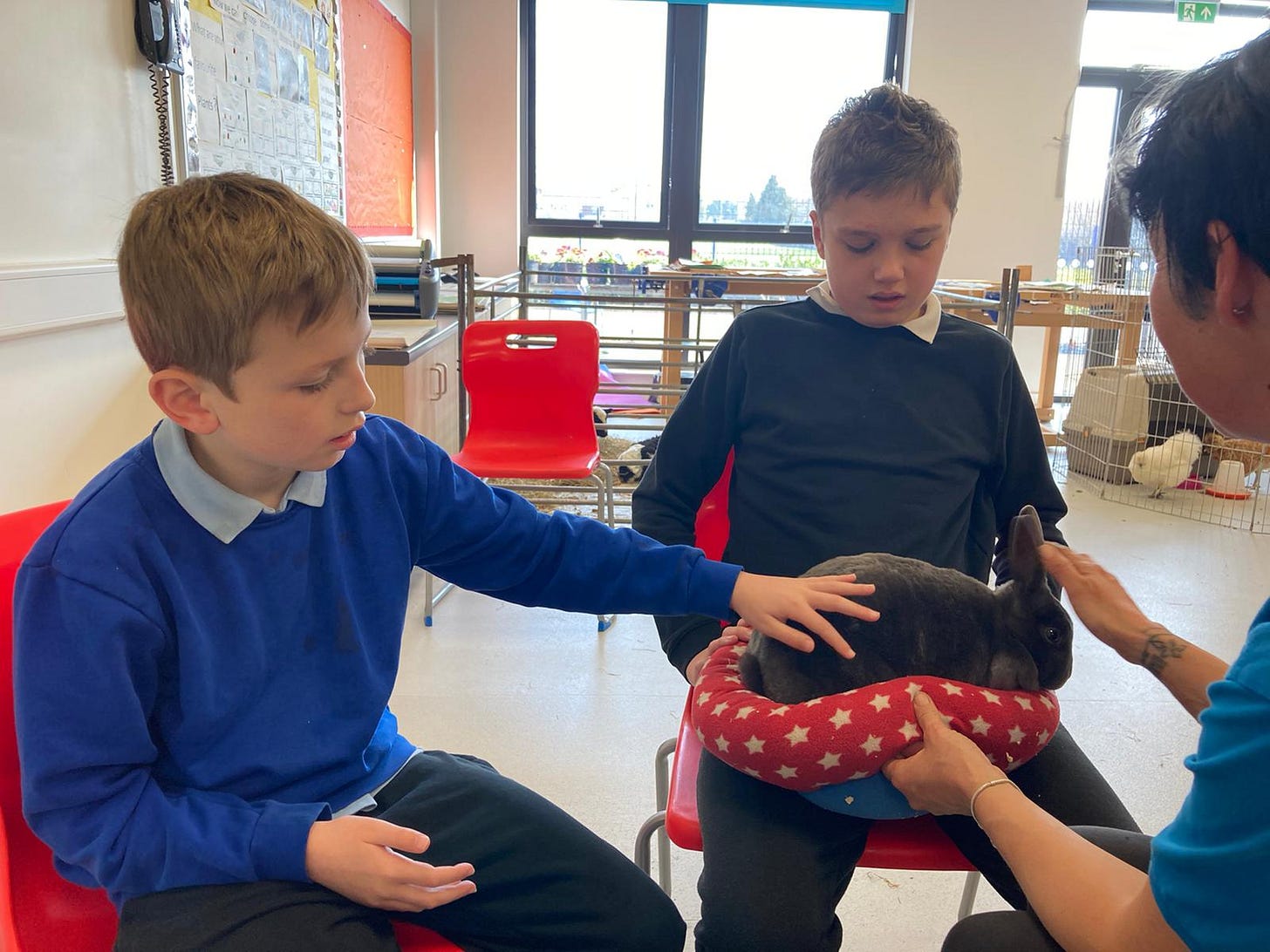Searching for the right school for your autistic child
Choosing a school for my boys and the emotions it stirred up
The summer holidays are coming to an end here in the UK, and tomorrow, Tommy and Jude will be going back to school. I know September, and back to school can stir up a whole mixture of emotions and situations for many parents out there who have autistic children.
Firstly there are the parents whose autistic kids desperately need school. They miss the routine, the structure, and the stimulation that the school day brings. The school environment is one that they’re comfortable in, and their parents can relax a little knowing that they’re being well looked after each day. The weekends are often quite isolating as accessing activities outside the home can be tricky. So a 6-week summer break can feel like forever.
Then there are the parents whose kids are struggling at the school they’re in. Maybe it’s the wrong setting, and they’re having to battle the system to try and secure an EHCP for extra support or be given a better schooling option. Maybe they’ve even been told that there is no space available for their child in a setting that would meet their child’s needs, so come September they’ll still be at home. Not out of choice, but because there is no other option.
**For anyone in the UK who is in this situation right now, please check out the work SEND Reform are doing, as they are campaigning for change. (You can find them on FB, IG, TikTok)
Then there are the parents whose children are starting school for the first time in the coming weeks. They’ve chosen a mainstream or an SEN setting, and they’re filled with a mixture of nervous excitement and fear about the journey their child is about to embark on.
Sending a child off to school for the first time is emotional for any parent. You worry if they will make any friends. You worry if they will cope with being away from you all day. You worry that they might get upset and that the teachers won’t be able to calm them down and look after them. But when your child is autistic (or has additional needs) those worries can be even more intense. Especially if your child is non-speaking or has limited communication.
I’ve been there. I remember those feelings all too well. And it’s from that starting point that I’m going to share with you some of our experiences with starting school.
Jude began school back in September 2012. He had been attending a mainstream nursery, which was going ok, and we now had a big choice to make. Should Jude attend a special needs school or a mainstream school with extra assistance?
We had various meetings with the team of people involved in Jude’s development to discuss what options were available. I remember at the time hoping for some guidance, desperately wanting someone to tell us what decision we should make for Jude’s future. They had more experience than we had. They’d worked with numerous autistic children and seen what had worked for them and what hadn’t worked. Why couldn’t they look at Jude and tell us what setting would be best for him? How did we know whether he should go to a mainstream or a special needs school?
Unfortunately, it didn’t work like that. The professionals weren’t allowed (or supposed) to give their opinion on sensitive decisions like this, no matter how much I wanted them to. I guess it’s because if we followed their advice and it didn’t work out, then what would happen? So, like any other parent, we went to see our different options.
What I write below is an attempt to recall the thoughts I had at the time, and describe how I felt…at that time. They were the thoughts of a parent new to the world of autism, new to the world of special needs, and a parent still very much in a confused, scared, and overwhelmed stage
We visited 4 special needs schools and 3 mainstream schools, and I think I cried during or after every single one
We started by looking at some mainstream schools in the hope that one of them might be right for Jude. If he went to a mainstream school we were told he would probably be entitled to full-time one-on-one support in the classroom with him too.
The schools we saw were all very nice, but it was clear they weren’t right for many different reasons. In short, it became clear as we visited them that they wouldn’t be able to meet Jude’s needs. Even to try to, felt like it wouldn’t be fair on Jude or the school.
Before going to see the schools I remember wondering whether being in a mainstream setting would encourage him to be more ‘normal.’ As if just being around other ‘neurotypical’ children would somehow encourage Jude to act like them. That he would copy their behaviours and everything would begin to be ok. I remember worrying that the reverse would also be true if we chose a special needs school and that being surrounded by other autistic children would hinder his development.
Feelings I’m not proud of, but feelings that were somewhat unconscious at the time.
I found my first experience of visiting a special needs school upsetting. Up to that point, the only person I’d spent any time with who was autistic was Jude. Walking into a classroom of 8 children slightly older than him, all of whom were autistic also, was a shock. Seeing autism on such a grand scale, these beautiful children all with their different challenges, was moving and emotional. It wasn’t the school life that I remembered as a child. At first glance, it seemed as far away from it as I could imagine.
I was too busy watching the other children rather than listening to the teacher showing us around. I was trying to spot the children who appeared most similar to Jude in their behaviours and traits.
Were they talking?
If so when did they start talking?
If they weren’t talking, what were they doing instead?
Which kids were bouncing, and galloping around rather than walking?
Were there any kids that were tapping every surface they passed?
I was trying to plot Jude’s future based on a 5-minute assessment of another autistic child who shared some similarities with him. As if that might somehow help me make the right decision for what school to choose.
In the early days of starting to understand autism and what it means for your child, you spend a lot of time searching for answers. You want to know what the future holds, as it seems so scary and full of unknowns. So when you walk into a school full of autistic children you can’t help but compare them to your own child, and wonder how they match up. Will Jude be like the 7-year-old who’s sitting there trying to draw, or will he be like the 7-year-old who is outside running up and down in the playground with an assistant as he’s struggling to be in a classroom? Will he be like the kid who’s come over and said hello, or will he be like the non-speaking 16-year-old we met in the corridor?
After spending an hour in the school we were suddenly back in the car, and the tears began to flow, having desperately tried to choke them back throughout the visit. It was an emotional experience.
There were some beautiful, lovely moments, but at the same time, I couldn’t help but feel upset for all of the children in there who had such a wide range of challenges. I was upset that I saw so much of Jude in so many of those children. I was still upset about everything that I thought Jude was missing out on. That he wouldn’t have the school experience (or life) I’d expected and taken for granted. Finding the right school for him was another step, another milestone that I just assumed would be a happy and exciting one. That wouldn’t be full of tears and fears.
We ruled out 2 of the schools very quickly. Whilst they seemed like good schools, they appeared way too clinical for us to even consider. They almost had a hospital feel about them. We were looking for something more. The third school was great but based in London, so that would mean moving and uprooting our whole lives.
When we went to see the 4th school we quickly realised this was the one for Jude. The amount of love and care shone through every member of staff we met. The whole ethos of the school just seemed to be right, and we were made to feel like they would go above and beyond for every child they taught. We went to see it another 3 or 4 times before committing to our decision, but I’d known within the first 5 minutes. This would be the right place for Jude to go. This was the right setting for him to go to. We left there feeling like THEY wanted Jude to go to their school.
We made it our first choice on the application, and a few months later we got the news we’d been accepted. There was a place for him.
But the anxiety and worry didn’t stop there.
When you’re sending a non-speaking child off to school for the first time, who has no idea of where he is going, and no real understanding of why they’ve just been left here, the fear and guilt are overwhelming. Those first few weeks were heart-wrenching, watching him look back as we left him, looking at us as if to say “What the hell is going on? Why are you leaving me here?”
I just assumed that by the time my child goes to school, they’ll understand what’s going on. It will have been a topic of conversation for months. They’ll know their teacher’s name, and maybe have some friends who are starting too. For Jude, and for Tommy a few years later, there was none of that.
When your child comes home, you assume they’ll tell you all about their day. Who they’re friends with, what they did, how they like (or dislike) their teacher. Again, for Jude and Tommy, we’ve never had that.
We’ve had to rely on communication between us and the school. The notebook, the emails, the phone calls, which still only tell you a fraction of what’s been going on. We’ve had to rely on the teachers getting to know them well enough to meet their needs and give them the support they need every day. That they’ll make sure our kids are eating and drinking enough and given help to go to the toilet. That they will recognise the triggers that make them feel overwhelmed, and remember how best to help them if they do feel that way. That they’ll tell us about the good days as well as the bad.
All the while, with no way of checking with our child to get their point of view, or to know what they think of school, other than relying on visual and behavioural clues.
This can make those first few months each year, whether starting school for the first time or joining a new class with a new teacher, more stressful than it should be. Than it could have been.
We’ve been lucky. Jude and Tommy both got into our first-choice school. the same school. It’s a setting that has proved to be the right one for them. Not every year has gone smoothly. There’s been many ups and downs along the way, with Jude or Tommy struggling for various reasons. Times where the amount of communication, or class dynamic hasn’t been ideal. But the school have always worked hard to try and make things better. They’ve worked with us, advised and supported us at every stage.
We’re now 11 and 7 years into their school lives, and overall it’s been a positive experience. Tommy loves school. The structure, the routine, the work, and the various activities, he thrives on it. He’s very excited about going back tomorrow.
Jude has had some harder times at school. Struggling like he does around other children, it hasn’t always been the best environment for him. But how happy he has been over the last few years is a testament to the progress he’s made and the hard work of those around him. He now has friends at school, other kids his age who he enjoys being with, when once he only wanted to be with the adults. Tomorrow morning will be a rude awakening for him as he has to wake up hours earlier than he has all summer. There’s also little preparation we can do with him, as for Jude everything he shows signs of understanding is in the here and now, not tomorrow or in the future. So it will come as a shock, but one he’s endured before, and within a few hours he’ll be back into the swing of things. I hope
I’m looking forward to tomorrow. I’ll be a little nervous for them, but I have years of lived experience to fall back on. I know deep down that both boys will be ok. I know that they’ll be well looked after, and their school will do all it can to help them learn, whilst also making sure they’re as happy as can be whilst doing so.
They’ll come home tomorrow evening, and I’ll know very little about their day, but their faces and body language will tell me most of what I need to know.
So for all of you parents out there whose children are going back to school this month, good luck. I hope the transition is a smooth one and they settle in well.
For those of you who are new to all of this, are scared and worried about how your child is going to cope, or whether you’ve chosen the right school, hang in there. How you feel is completely natural. You’ve made the best choice you could, now you need to trust your decision. Keep communicating with the school and keep feeding back to them anything you’re noticing. It will get easier.
For those of you whose children are struggling or who have no school place, my heart goes out to you. Keep pushing and fighting for the education your child needs and deserves. The right setting can make such a difference. It should for your child too.
I hope our story has helped some of you. Good luck everyone ❤







Thank you for sharing. This has been so helpful - I’m new to this, my son is beginning pre school and it’s all very scary. Thanks for your wonderful words of encouragement!
As the father of a neurodivergent son, I appreciate your work. Thank you.